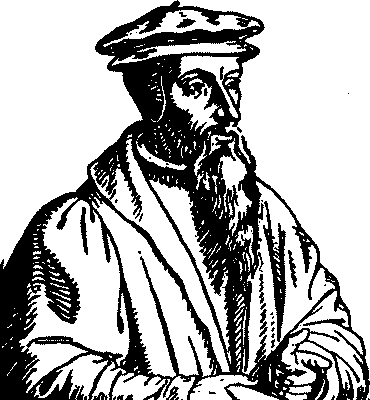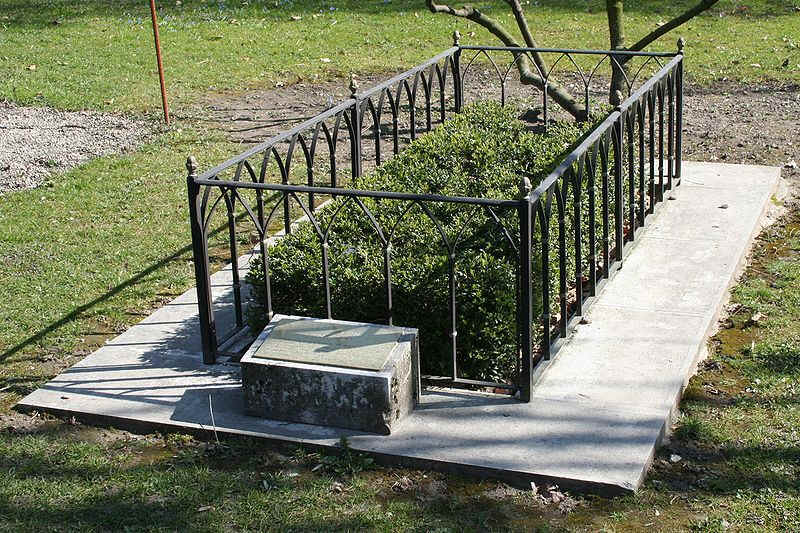JOHN
CALVIN
"He
doth bestride the narrow world like a Colossus"
 Shakespeare
used these words to describe Julius Caesar and they could equally be used in
respect of one of the fathers of the Protestant religion, John Calvin who was
born Jean Cauvin, five hundred years ago in 1509 in Noyon in the Picardy region
of France. One of three sons, he was destined for the priesthood and began his
studies accordingly. However, his father decided that the law would be a more
profitable occupation and young Jean changed his course. He studied both
philosophy and the law and during this time he became attracted to the doctrines
of Humanism. In 1533 he underwent a strong religious conversion which convinced
him of the absolute glory and power of God and, also, the absolute sinfulness
and depravity of mankind. This was to shape his opinion and doctrines throughout
his life.
Shakespeare
used these words to describe Julius Caesar and they could equally be used in
respect of one of the fathers of the Protestant religion, John Calvin who was
born Jean Cauvin, five hundred years ago in 1509 in Noyon in the Picardy region
of France. One of three sons, he was destined for the priesthood and began his
studies accordingly. However, his father decided that the law would be a more
profitable occupation and young Jean changed his course. He studied both
philosophy and the law and during this time he became attracted to the doctrines
of Humanism. In 1533 he underwent a strong religious conversion which convinced
him of the absolute glory and power of God and, also, the absolute sinfulness
and depravity of mankind. This was to shape his opinion and doctrines throughout
his life.
He was constantly falling foul of the
authorities. He was forced to flee Paris after clashing with the faculty members
of the College Royal in Paris, having been declared a heretic. He took refuge in
Basle in Switzerland where he wrote his ‘Institutes of Christian Religion’,
which was a defence of his faith and a a statement of the doctrinal position of
the Reformers. He was to revise it several times throughout his life. He
returned briefly to France to settle his fathers affairs, but after the Edict of
Courcy - which gave heretics a six month period to reconcile with the Catholic
faith, - he decided he had no future in his homeland.
On a visit to Geneva he was invited by William
Farel to join a group of Protestant Reformers who were working to implement
their ideas through the town council which they controlled. Calvin compiled a
list of strict regulations intended to make all citizens submit to the
profession of faith created by the council. This was not at all acceptable and
again Calvin had to leave.
His final split with Geneva came when relations
between Calvin, Farel and the council, finally broke down. They objected to the
imposition of uniformity of church services upon Geneva (and therefore
themselves). This was partly a political issue stemming from the city of Bern.
The council ordered Calvin and Farel to use unleavened bread for the Easter
Eucharist. They refused and did not administer communion during the service
which caused a riot. Once again, Calvin had to leave and this time he received a
welcome in Strasbourg.
During his time in Strasbourg he had an extremely
busy ministry, preaching and writing more books. Meanwhile in Geneva the
situation had changed. Church attendance was dwindling and the alliance with the
city of Bern was unravelling. The council received a letter from Cardinal
Sadoleto inviting the citizens to return to the Catholic faith. The council
needed an ecclesiastical authority to reply and their (second) choice was
Calvin. This he did and in 1540 he was invited back to Geneva. At first he
flatly refused, but in the following year it was agreed that he be ‘loaned’
for six months. On 13th September 1541, with an official escort and a
wagon for his family, he returned to Geneva. He was able to continue with his
reforms, reconstructing the city along Old Testament lines. Activities such as
gaming and dancing were forbidden and severe punishments were meted out for even
minor religious offences. The sin of backsliding into Catholic superstition was
considered the most serious. He had achieved considerable power and influence
and dissenters could suffer torture and death if caught. The most famous was a
physician called Michael Servetus who had declared that Calvin was wrong to
combine church and state. He was burned at the stake and became a symbol of
religious repression. At that time Protestantism was no more forgiving of
perceived heresy than the Spanish Inquisition! Eventually he triumphed over all
his critics. He continued to write and to preach (over 2,000 sermons in all). He
gave shelter to many fleeing Catholic
repression, one notable personage being the Scot, John Knox, another man with
extremely strong opinions.
 In the autumn of 1588 he fell ill and died, still
revising his ‘Institutes’. At his lying-in-state, the Reformers were
concerned at the huge crowds coming to pay their respects and, fearing a new
saint’s cult, they buried him secretly in an unmarked grave. He lies in the
Cemetery of Plainpalais in Geneva, the city in which he had fought so many
battles.
In the autumn of 1588 he fell ill and died, still
revising his ‘Institutes’. At his lying-in-state, the Reformers were
concerned at the huge crowds coming to pay their respects and, fearing a new
saint’s cult, they buried him secretly in an unmarked grave. He lies in the
Cemetery of Plainpalais in Geneva, the city in which he had fought so many
battles.
A man with a prodigious intellect and very strong
faith, but his was not an easy doctrine. He believed firmly in predestination;
that human beings were all sinful and depraved and nothing can be done to secure
a place in heaven. God had elected that some would be redeemed and the rest face
damnation. The ‘elect’ were the fortunate and the rest had to accept their
fate as nothing they could do would have any influence on their place in the
hereafter. He cannot have been an easy man to live and work with. He married
Idette de Bure, a widow with two children in 1540, an earlier attachment had
come to nothing. The words compromise, forgiveness, tolerance do not seem to
have had a place in his vocabulary. He did not appear to subscribe to the belief
that repentance could save. And as far as I can tell, he did not visualise a God
of love. He was one of the founding fathers of the Protestant Church and as such
is to be respected.
If I were to travel back in time, I would very
much like to have met and heard John Wesley, but I think I would ‘pass’ on
John Calvin!
Barbara Hothersall
 Shakespeare
used these words to describe Julius Caesar and they could equally be used in
respect of one of the fathers of the Protestant religion, John Calvin who was
born Jean Cauvin, five hundred years ago in 1509 in Noyon in the Picardy region
of France. One of three sons, he was destined for the priesthood and began his
studies accordingly. However, his father decided that the law would be a more
profitable occupation and young Jean changed his course. He studied both
philosophy and the law and during this time he became attracted to the doctrines
of Humanism. In 1533 he underwent a strong religious conversion which convinced
him of the absolute glory and power of God and, also, the absolute sinfulness
and depravity of mankind. This was to shape his opinion and doctrines throughout
his life.
Shakespeare
used these words to describe Julius Caesar and they could equally be used in
respect of one of the fathers of the Protestant religion, John Calvin who was
born Jean Cauvin, five hundred years ago in 1509 in Noyon in the Picardy region
of France. One of three sons, he was destined for the priesthood and began his
studies accordingly. However, his father decided that the law would be a more
profitable occupation and young Jean changed his course. He studied both
philosophy and the law and during this time he became attracted to the doctrines
of Humanism. In 1533 he underwent a strong religious conversion which convinced
him of the absolute glory and power of God and, also, the absolute sinfulness
and depravity of mankind. This was to shape his opinion and doctrines throughout
his life. In the autumn of 1588 he fell ill and died, still
revising his ‘Institutes’. At his lying-in-state, the Reformers were
concerned at the huge crowds coming to pay their respects and, fearing a new
saint’s cult, they buried him secretly in an unmarked grave. He lies in the
Cemetery of Plainpalais in Geneva, the city in which he had fought so many
battles.
In the autumn of 1588 he fell ill and died, still
revising his ‘Institutes’. At his lying-in-state, the Reformers were
concerned at the huge crowds coming to pay their respects and, fearing a new
saint’s cult, they buried him secretly in an unmarked grave. He lies in the
Cemetery of Plainpalais in Geneva, the city in which he had fought so many
battles.